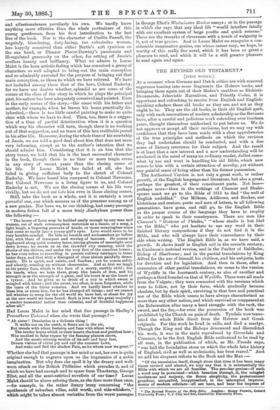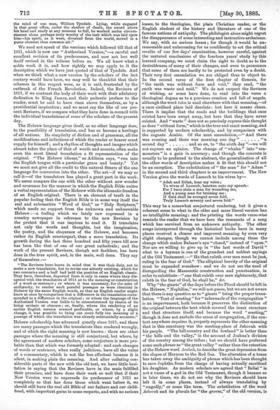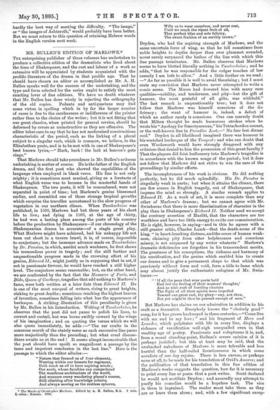THE REVISED OLD TESTAMENT.* [FIRST NOTICE.] AT a moment when
German and Dutch critics are with renewed eagerness tearing into more fragments the Hebrew books, and bringing them again out of their Medea's cauldron as Elobistic Documents, Jehovistic Narratives, and Priestly Codes, it is opportune and refreshing to receive from English and English speaking scholars those old books as they are, and not as they ought to be. They are the old books, in their old English garb, only with such renovations of modern scholarship as the Revisers have, after a careful and judicious work extending over fourteen years, thought themselves authorised to put before us. We do not approve or accept all their revisions, but we may say with confidence that they have been made with a clear apprehension of the true principles and methods on which the revision they had undertaken should be conducted, and with a due sense of literary reverence for their subject. And the result is at least that a new interest and a new understanding will be awakened in the mind of many an ordinary reader, dulled some what by use and wont in handling his old Bible, which now comes to him with a certain attraction of novelty, yet without any painful sense of being other than his former possession. The Authorised Version is not only a great work, or rather growth, of the English language and literature, but also a great, perhaps the greatest, of their constituent parts. Not less— perhaps more—than in the writings of Chaucer and Shake speare must we go to the Bible of 1611 to find "the well of English undefiled." Our Milton, Addisons, and Burkes, our historians and orators, poets and men of letters, in all following generations, have gone, and still go, to the English Bible as the proper source of the language they have to employ in order to speak to their countrymen. There are men like Chaucer's " Doetour of Phisike," " whose studio is but litel on the Bible," who yet hesitate to use any word in their finished literary compositions if they do not find it in the Bible, and who will always have their concordance by their side when writing. The English Bible is, as we have said, a growth. It shows itself in English soil in the seventh century, in Caedmon's metrical version, and in the Psalter of Ealdhelm, Bishop of Sherborne ; and in the partial translations by King Alfred for the use of himself, his children, and his subjects, both, for devotion and for legislation. And then in these, after a succession of other partial translations, we come to the version of Wycliffe in the fourteenth century, as also of another and perhaps a third founded on that of Wycliffe. These were all made from the Vulgate ; they were connected with the versions which were to follow, not by their form, which gradually became obsolete, but by their spirit, surviving in that love and practical use of the Bible which seems to have always characterised us more than any other nation, and which survived or reappearedat the Reformation after many a hard struggle with the rack, the sword, and the fire,—for even the possession of the book was prohibited by the Church on pain of death. Tyndale now trans lated the whole Bible direct from the Hebrew and Greek originals. For this work he lived in exile, and died a martyr. Though the King and the Bishops denounced and discredited his work, it was in the main reproduced by Coverdalo and Cranmer, to be the first English Bible authorised to be read by all men, in the publication of which, as Mr. Fronde says, "was laid the foundation stone on which the whole later history of England, civil as well as ecclesiastic, has been reared." And we add his eloquent tribute to the Book and the Man :—
" Of the translation itself, though since that time it has been many times revised and altered, we may say that it is substantially tho Bible with which we are all familiar. The peculiar genius—if such a word may be permitted—which breathes through .it, the mingled tenderness and majesty, the Saxon simplicity, the preternatural grandeur, unequalled, unapproached, in the attempted improvements of modern scholars—all are hare, and bear the impress of the mind of one man, William Tyndale. Lying, while engaged in that great office, under the shadow of death, the sword above his head and ready at any moment to fall, he worked under circumstances alone perhaps truly worthy of the task which was laid upon him—his spirit, as it were, divorced from the world, moved in a parer element than common air."
We need not speak of the versions which followed till that of 1611, which is now our "Authorised Version,"—a careful and excellent revision of its predecessors, and now not less well itself revised in the volume before us. We all know what a noble work it is, and how rightly we may apply to it the description which we have just quoted of that of Tyndale. And when we think what a new version by the scholars of the last century would have been, we may well be thankful that their schemes in this respect were, as it is said, frustrated by the outbreak of the French Revolution. Indeed, the Revisers of 1611, if we contrast the body of their work with their adulatory dedication to King James, and their pedantic preface to the reader, must be said to have risen above themselves, as by a providential inspiration ; and we must say the like of our pre sent Revisers, if we compare what they have done in council with the individual translations of some of the scholars of the present day.
The Hebrew language gives itself, as no other language does, to the possibility of translation, and has so become a heritage of all nations. Its simplicity of diction and of grammar, all the modifications and inflections of which the reader or hearer must supply for himself ; and a rhythm of thoughts and images which almost takes the place of that of words and accents, often make
even the most literal translation a fit representation of the original. "The Hebrew idioms," as Addison says, "run into
the English tongue with a particular grace and beauty." Yet we must not give all the credit to this natural fitness of the one language for conversion into the other. The art—if we may so call it—of the translators has played a great part in the work. We never compare the one with the other without new wonder and reverence for the manner in which the English Bible unites a verbal representation of the Hebrew with the idiomatic freedom of an English original. There is an element of truth in the popular feeling that the English Bible is in some way itself the real and substantive " Word of God," or " Holy Scripture," which needs no support from the unknown and unknowable Hebrew :—a feeling which we lately saw expressed in a country newspaper in reference to the new Revision by the protest that it was impious to read it. It translates not only the words and thoughts, but the imagination, the poetry, and the eloquence of the Hebrew, and becomes rather its English counterpart, than a mere translation. Its growth during the last three hundred and fifty years till now has been like that of one of our great cathedrals; and the work of the present Revisers, though not faultless, has been done in the true spirit, and, in the main, well done. They say of themselves :—
" The Revisers have borne in mind that it was their duty, not to make a new translation, but to revise one already existing, which for two centuries and a half had held the position of an English classic. They have, therefore, departed from it only in cases where they disagreed with the translators of 1611 as to the meaning or construction of a word or sentence ; or where it was necessary, for the sake of uniformity, to render such parallel passages as were identical in Hebrew by the same English words, so that an English reader might know at once by comparison that a difference in the translation corresponded to a difference in the original ; or where the language of the Authorised Version was liable to be misunderstood by reason of its being archaic or obscure ; or, finally, where the rendering of an earlier English version seemed preferable, or where, by a slight change, it was possible to bring out more fully the meaning of a passage of which the translation was already substantially accurate."
Hebrew scholarship has advanced greatly since 1611, and there are many passages which the translators then rendered wrongly, and of which the right meaning is now known : there are other passages where the meaning is still conjectural, but where, by the agreement of modern scholars, some conjecture is more probable than that which was formerly adopted: and such changes of words or sentences, when really judicious, have all the value of a commentary, which is not the less effectual because it is silent, in making plain the meaning. And after collating considerable parts of the new with the old text, we have little hesi tation in saying that the Revisers have in the main fulfilled their promises, and have done their work so well that if their New Version were to supersede its predecessor of 1611 as completely as that has done those which went before it, we should still have the real old Bible of our fathers and our child hood, with important gains in some respects, and with no serious losses, to the theologian, the plain Christian reader, or the English student of the history and literature of one of the famous nations of antiquity. The philologist alone might regret the disappearance of some interesting and instructive archaisms.
We say, with no serious losses ; for though it would be un reasonable and unbecoming for us confidently to set the critical results of our few days' examination, however careful, against the matured conclusions of the fourteen years' study by this learned company, we must claim the right to doubt as to the desirableness of many of their changes, and even to pronounce that some of them are hardly to be protected even by a doubt. Their very first emendation we are obliged thus to object to. In the second verse of the first chapter of Genesis, for " the earth was without form and void," they read, " the
earth was waste and void." We do not suspect the Revisers of wishing, as some have done, to read into the verse a theological dogma as to a previous creation and fall of angels, although the word tohu is used elsewhere with that meaning,—of
a once civilised place laid desolate : but here it means chaos. There it implies that the roads and the buildings that once existed have been swept away, but here that they have never existed. And "waste " does not so precisely express this thought as does "without form," which is the true and exact meaning, and is supported. by modern scholarship, and by comparison with the cognate Arabic. Of the next emendation,—" And there was evening and there was morning one day ' " a second day" and so on, to "the sixth day "—we will not express an opinion. The change of " whales " into " seamonsters" is a gain in accuracy ; and though the concrete is usually to be preferred to the abstract, the generalisation of all the other words of description makes it fit that this should not be an exception. The substitution of " the man " for " Adam " in the second and third chapters is an improvement. The New Version gives the words of Lamech to his wives by
" Adah and Zillah, hear my voice ;
Ye wives of Lamech, hearken unto my speech : For I have slain a man for wounding me, And a young man for bruising me : If Cain shall be avenged seven fold, Truly Lamech seventy and seven fold."
This may be a somewhat conjectural rendering, but it gives a coherent sense to what in the older and more literal version has no intelligible meaning ; and the printing the words verse-wise reminds the reader that we have here the remnants of a song which has survived from an unknown antiquity. The other songs interspersed through the historical books have in many places received a clearer and improved meaning by even very slight changes, though we cannot include among these the change which makes Balsam's eye "closed," instead of " open." Nor are we willing to give up in " the last words of David " what to a layman is one of the grandest and noblest sayings of the Old Testament :—" He that ruleth over men must be just, ruling in the fear of God." The elliptical brevity of the original must be expanded somehow : and we do not see the need of disregarding the Massoretic construction and punctuation, in order to substitute —" one that rnleth over men righteously, that ruleth in the fear of God, he shall be," &c.
Why "the giants" of the days before the Flood should be left in the Hebrew, " Nephilim," we will not guess, but we are not aware that there is any question as to " giants " being the proper trans lation. "Tent of meeting "for "tabernacle of the congregation" is an improvement, both because it preserves the distinction of the original between the tent which covered the inner structure and that structure itself, and because the word "meeting," though it does not exclude the sense of congregation, if the context anywhere requires it, properly represents the other meaning that in this sanctuary was the meeting-place of Jehovah with his people. "The hill-country and the lowland" is better than "the hills and the valley," in the account of Joshua's division of the country among the tribes ; but we should have preferred some such phrase as " the great valley " rather than the retention
of the Hebrew word Arabah, to describe the great depression from
the slopes of Hermon to the Red Sea. The alteration of a tense has taken away the ambiguity of phrase which has been thought to save Jephtha from the charge of having actually sacrificed his daughter. As modern scholars are agreed that " Belial " is not a name of a god in the Old Testament, though it became so in later times, we do not see why the Revisers should have left it in some places, instead of always translating by
"ungodly," or some like term. The substitution of the word Asher ah and its plurals for "the groves," of the old version, is
hardly the best way of meeting the difficulty. "The image," or " the images of Ashteroth," would probably have been better. But we must return to this question of retaining Hebrew words in the English version next week.
















































 Previous page
Previous page